Nutrition for Competitions: Advanced Strategies for Peak Performance
Updated On: November 12, 2025 by Aaron Connolly
Core Principles of Nutrition for Competitions
When it comes to competition nutrition, you’ve got to fuel your body at the right times if you want to keep your performance sharp. The trick is matching what you eat to the demands of your event and keeping your macronutrients in check.
Understanding Competition-Specific Needs
Every event pushes your body in its own way. A 100m sprint? That’s all about explosive power for a few seconds. A marathon? Now you’re talking hours of steady effort.
Short events under 30 seconds draw on energy stored right in your muscles. You’ll burn through phosphocreatine and muscle glycogen, and you won’t even need oxygen for it.
Longer events, the ones that last minutes or hours, pull energy from different places. Your body taps into muscle glycogen, blood glucose from your liver, and even fat stores.
Event duration shapes your nutrition game plan:
- Under 10 minutes: Load up before you start
- 10-60 minutes: Take in light carbs during the event
- Over 60 minutes: Replace fuel regularly
Don’t forget the environment. Hot weather means you’ll need more fluids. Cold days might make you crave extra calories. High altitude? That changes how you handle oxygen.
If you’re well-trained, you’ll burn fat more efficiently and save your glycogen for when you really need it.
The timing of your competition matters too. Morning events call for a smart breakfast. If you’re competing at night, you’ll want steady energy all day.
Macronutrient Balance for Performance
Carbohydrates are really your main fuel during competition. They give you quick energy and help your brain stay sharp when things get tough.
Your carb needs change depending on how long you’re competing:
- 1-3 hours before: Eat 1-4g per kg of body weight
- During events over 60 minutes: Aim for 30-60g per hour
- Multiple events in a day: You might need up to 90g per hour
Protein helps your muscles work and recover, especially in longer competitions. Try to get 1.2-2.0g per kg of body weight each day.
Add a bit of protein to meals you eat 3-4 hours before competing. This keeps your blood sugar steady.
Fat gives you longer-lasting energy, but it takes its sweet time to digest. Eat healthy fats regularly, but keep them low in meals right before you compete.
Stick to less than 20% of calories from fat in meals you eat within four hours of your event.
Micronutrients—like iron, B vitamins, and electrolytes—play their own roles. Iron moves oxygen, B vitamins turn food into energy, and electrolytes keep your fluids balanced.
Whole foods should be your go-to for micronutrients. Supplements aren’t a magic fix, and your health depends on what you eat every day, not just on game day.
Pre-Competition Nutrition Essentials
Dialing in your pre-competition nutrition can make a huge difference when it’s time to perform. You’ve got to time your meals right, pick foods that won’t mess with your stomach, and load up on carbs in the days before your event.
Timing and Meal Planning
Make sure you eat your last big meal 3-5 hours before you compete. That gives your body time to digest and still keeps your energy up when you need it.
For morning events, breakfast is your MVP. Your liver burns through glycogen overnight, so you need to fill up those reserves.
Don’t eat anything heavy within an hour of competing. If you do, you might end up with a stomachache or a blood sugar crash. If you’re really hungry, sip on a sports drink or nibble a couple of dates.
Stick to foods you’ve already tried during training. Competition day is not the time for food experiments or new supplements.
Here’s a simple meal timing plan:
- 3-5 hours before: Main meal
- 2-3 hours before: Light snack, if needed
- 1 hour before: Just liquids—water or sports drinks
- 30 minutes before: Only a few sips of fluids
Optimal Pre-Event Foods
Pick high-carb foods that are easy to digest. Your muscles want fuel, but your stomach needs to stay calm.
Some solid pre-competition options:
- Porridge with honey or jam
- Toast with honey or banana
- Cereal with low-fat milk
- Pasta with a plain tomato sauce
- Rice with a bit of lean protein
- Bananas or other easy fruits
Skip high-fibre foods before you compete. Too much fibre can send you running for the bathroom. Avoid beans, wholegrain cereals, and big servings of raw veggies.
You might also want to avoid these foods 24 hours before your event:
- Dairy (if you’re even a little lactose intolerant, it’s not worth the risk)
- High-fat foods (they’re just too slow to digest)
- Spicy or new foods
- Foods loaded with fructose
- Big servings of protein
Keep your portions reasonable. You want full muscles, not a heavy stomach.
Carbohydrate Loading Strategies
Start ramping up your carbs three days before your event. It’s not about one huge pasta dinner the night before—that’s a common mistake.
For those three days, eat more carbs than usual and ease up on training. That combo fills your muscle glycogen tanks.
A quick carb loading plan:
- Day 3: 7-10g carbs per kg body weight
- Day 2: 7-10g carbs per kg body weight
- Day 1: 7-10g carbs per kg body weight
- Competition day: 1-4g carbs per kg body weight (3-4 hours before)
If you weigh 70kg, you’re looking at 490-700g of carbs per day during loading. That’s a ton—think 6-8 cups of cooked pasta or rice daily.
Some easy carb sources:
- White rice and pasta
- White bread and bagels
- Sports drinks and fruit juice
- Bananas and dried fruit
- Low-fibre cereals
The goal? Muscles full, belly light. Do the heavy lifting with carbs in advance, and keep your pre-event meal familiar and not too big.
Hydration Strategies for Peak Performance
Hydration can boost your performance by 5-15% and keep you safe from heat issues during tournaments. You can lose anywhere from half a litre to three litres of sweat per hour, so a personal hydration plan really matters if you want to stay sharp.
Hydration Timing and Frequency
Start hydrating 3-4 hours before your event. Drink 5-7 mL per kg of body weight, and add 300-500 mg of sodium per litre.
Hydration timeline:
- 3-4 hours before: Main hydration
- 2 hours before: Another 250-400 mL if your urine is dark
- 30 minutes before: Last 200-300 mL
During your event, aim to replace 70-80% of sweat loss. Trying to replace everything can upset your stomach and actually slow you down.
How often to drink:
- Sessions under 45 minutes: Water every 20 minutes
- Longer sessions: Sports drinks every 15-20 minutes
- Marathon gaming: 150-250 mL every 15 minutes
Check your hydration by looking at your morning urine. Pale yellow? You’re good. Dark yellow? Drink up before you compete.
Electrolytes and Fluid Balance
You can lose anywhere from 200 to 2,000 mg of sodium per litre of sweat. That’s a huge range, and it depends on your own sweat rate and the environment.
Sodium targets by session:
- Under 45 minutes: 200-400 mg/L
- 45-90 minutes: 400-700 mg/L
- Over 90 minutes: 500-1,000 mg/L
Key electrolytes:
- Sodium: Keeps fluids balanced and nerves firing
- Potassium: Helps muscles contract and supports your brain
- Magnesium: Cuts down on cramps and keeps you focused
Even if you’re just 2% dehydrated, your brain can slow down and your decisions get worse. Reaction times can drop by 12% if you don’t stay hydrated.
If you’re a pro, consider getting your electrolyte levels tested. Most folks can use regular sports drinks, but top athletes might need custom blends based on their sweat.
Nutrition During Competition
What you eat and drink during competition can decide how you finish. Smart choices keep your energy steady and your brain on point right to the end.
Fast-Digesting Foods for Sustained Energy
You need quick fuel during your event, but not every carb gets the job done the same way. Bananas are a classic—they digest fast and give you 30-45 minutes of energy. Sports drinks hit even quicker, sometimes in just 10-15 minutes.
Energy gels are another go-to, especially for endurance events. Take one every 30-45 minutes, but always chase it with water, not another sports drink, or your stomach might complain.
Some other simple options:
- 2-3 dates
- White bread with honey
- 6-8 sports jellybeans
- Diluted fruit juice
Skip high-fat or high-fibre foods during competition. They just slow you down and can cause cramps.
Time your snacks to your event. Events under an hour? You might get a boost just by rinsing your mouth with a carb drink. Longer events need 30-60g of carbs each hour after the first hour.
Intra-Event Hydration Solutions
How much you need to drink depends on your sweat rate, how long you’re competing, and the conditions. Most people lose between 0.5 and 2 litres per hour when things get intense.
Water is fine for events under an hour. If you’re going longer, you need electrolytes to replace what you lose in sweat.
A good sports drink should have:
- 6-8% carbs
- 200-300mg sodium per 500ml
- A little potassium
You can make your own: 500ml water, 2-3 tablespoons sugar, and a pinch of salt. It’s cheap and works just as well.
A few hydration tips:
- Drink 150-250ml every 15-20 minutes
- Use a bottle with measurements
- Pick flavours you actually enjoy
- Always test your drinks during training, not on game day
Don’t wait until you’re thirsty. By then, you’re already behind. Keep sipping as you go to stay on top of your game.
Post-Competition Recovery Nutrition
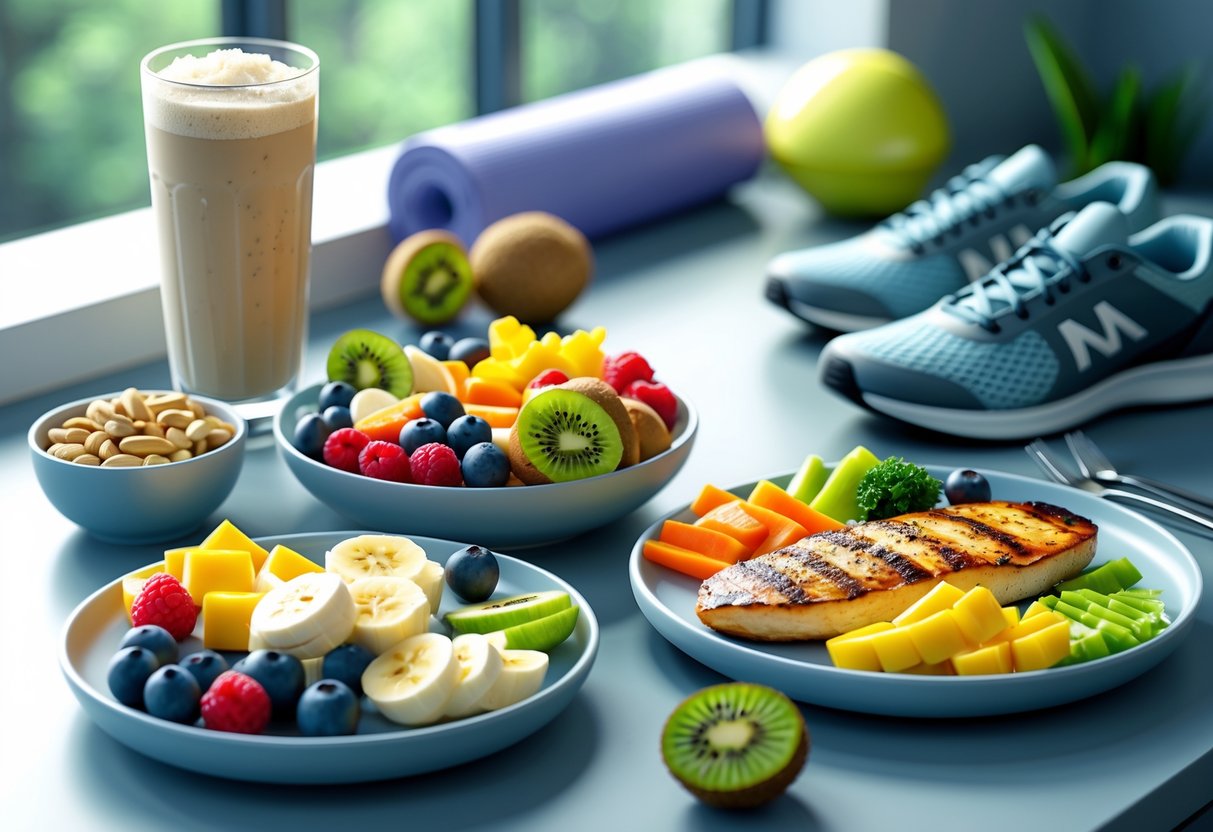
Right after you finish competing, your body needs specific nutrients to repair muscle and refill energy stores. Get a good mix of protein and carbs within two hours, and you’ll bounce back faster for your next session or tournament.
Protein for Muscle Repair
Protein matters a lot after intense gaming sessions—your muscles actually need those amino acids to recover and get stronger. Most esports athletes don’t realize how physical gaming can get, but hours of precise movements and trying to keep good posture really do lead to muscle fatigue.
Try to get 20-25 grams of high-quality protein within half an hour after your match. This window helps your body kick off protein synthesis, repairing muscle tissue right when you need it most.
Top protein sources for post-competition recovery:
- Greek yoghurt (15g protein per serving)
- Chocolate milk (8g protein, plus carbs)
- Protein shake with whey or plant-based powder
- Hard-boiled eggs (6g protein each)
- Lean chicken breast (25g per 100g)
Here’s a quick win: stash some protein bars at your gaming setup for immediate nutrition. Aim for bars with at least 15g protein and not too much added sugar.
Your muscles keep repairing for up to 48 hours after you compete. So, you really want to keep protein intake steady throughout your recovery period, not just right after the match.
Carbohydrate Replenishment
Carbohydrates refuel your brain and muscles—you burn through energy fast during those marathon gaming sessions. The brain runs on glucose, so getting enough carbs is key for sharp focus and reaction times.
Try to eat 30-60 grams of carbohydrates with your protein within two hours after competing. This combo spikes insulin, which helps your muscles soak up nutrients faster.
Best carbohydrate choices for recovery:
| Food | Carbs (grams) | Benefits |
|---|---|---|
| Banana | 27g | Fast-digesting, portable |
| Oatmeal (1 cup) | 30g | Sustained energy release |
| Sweet potato | 26g | Rich in vitamins |
| Chocolate milk | 26g | Protein + carb combo |
Watch out for high-sugar snacks like sweets or fizzy drinks—they’ll spike your energy then leave you crashing.
Most esports athletes do well with a 4:1 carb-to-protein ratio. So, if you eat 20g protein, pair it with about 80g carbs for solid recovery.
Long gaming sessions—over two hours—really drain your muscle glycogen. If you skip carb replenishment, you’ll feel it in your next match or practice.
Nutritional Needs by Sport Type
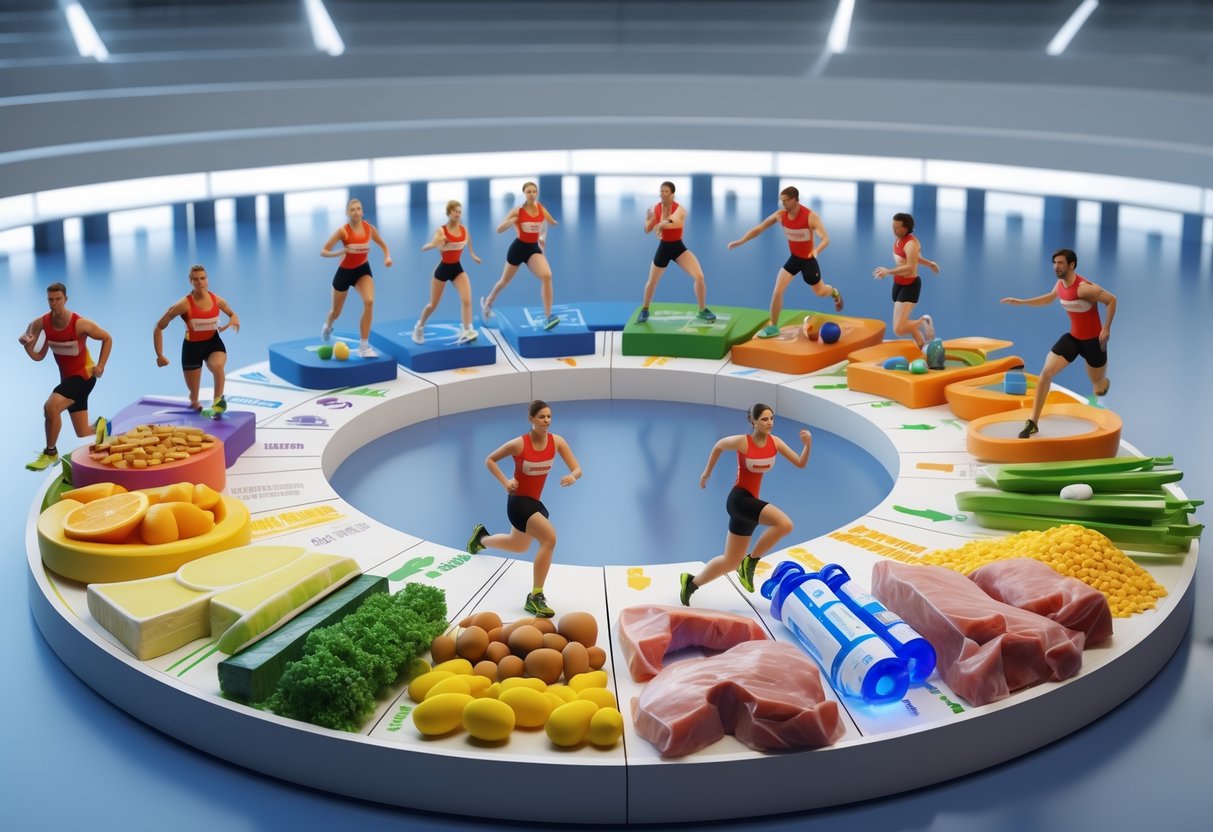
Different sports push your body in their own ways, so your nutrition plan should match your training style. Endurance athletes burn through carbs for long-lasting energy, but strength and power athletes need more protein to keep those muscles growing and healing.
Endurance Events
Endurance sports—cycling, running, swimming, rowing—demand steady energy over time. Carbs are your main fuel here.
Carbohydrate Requirements Go for 3-4 grams of carbs per pound of body weight each day. A 150-pound endurance athlete needs about 450-600 grams of carbs daily. Stick with whole grains, fruits, and starchy veggies like sweet potatoes.
Timing Matters Eat a carb-heavy meal 3-4 hours before training. For events over 90 minutes, take in 30-60 grams of carbs per hour using sports drinks or gels.
Protein and Fat Balance Aim for 0.5-0.7 grams of protein per pound of body weight. Keep fat moderate, around 0.3-0.4 grams per pound. This helps you recover but won’t slow digestion during workouts.
Hydration Focus Endurance athletes sweat out a lot of fluids. Drink 500-600ml of fluid 2-3 hours before exercise. While training, sip 150-250ml every 15-20 minutes.
Strength and Power Sports
Weightlifting, sprinting, rugby, and football all need explosive power and muscle mass. These athletes need more protein to keep muscles repairing and growing.
Protein Priority You’ll want 0.8-1.2 grams of protein per pound of body weight daily. A 200-pound athlete needs 160-240 grams of protein. Spread lean meats, fish, eggs, and dairy throughout your meals.
Carbohydrate Strategy Stick to 2-3 grams of carbs per pound of body weight. This fuels your training and keeps muscle glycogen topped up. Time most of your carbs around workouts for the best results.
Recovery Nutrition Within 30 minutes after your workout, eat 20-40 grams of protein with 30-60 grams of carbs. This combo gets muscle repair and energy recovery going.
Creatine Consideration Many strength athletes use 3-5 grams of creatine daily. It helps you maintain power during repeated high-intensity efforts.
Customising Nutrition for Age and Gender
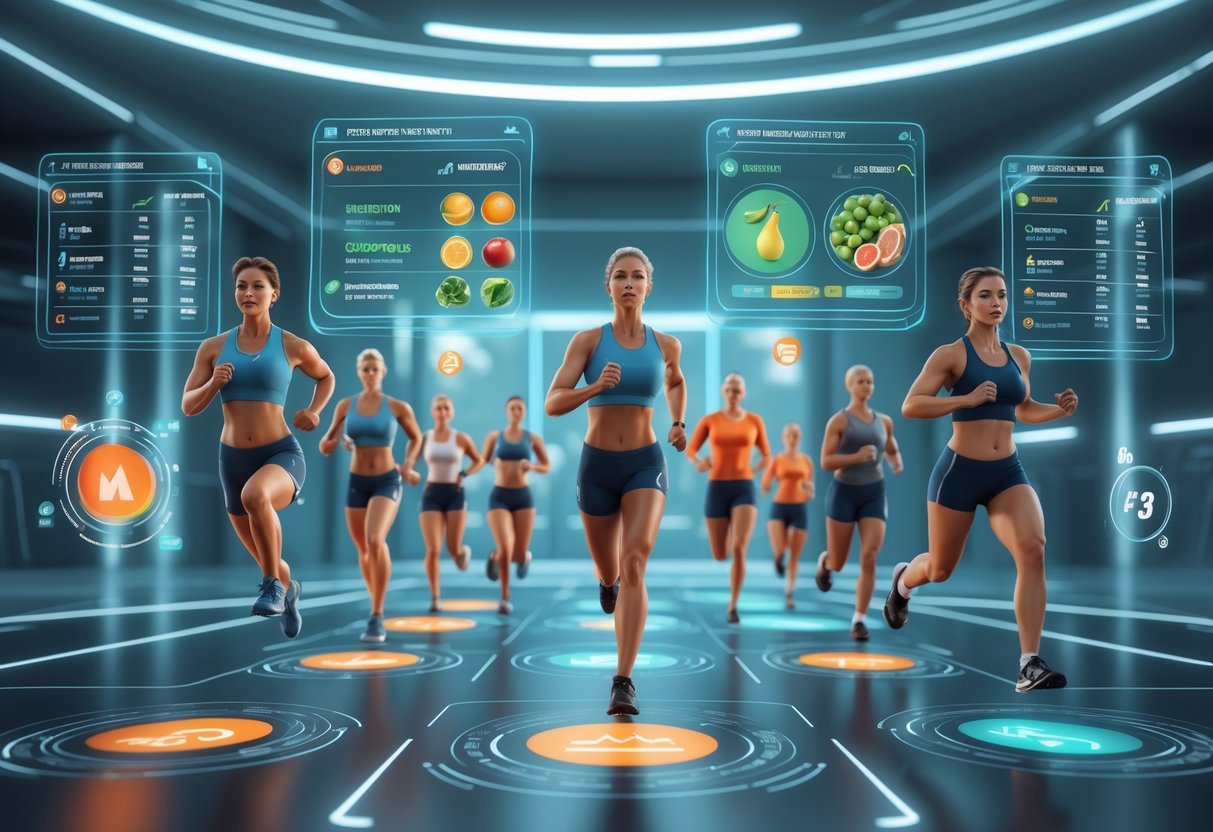
Young competitors need more calories per kilogram than adults, while female athletes have unique needs to avoid energy deficiency and support hormones. One-size-fits-all nutrition plans just don’t cut it for competition prep.
Fuelling for Youth Competitors
Athletes aged 12-18 burn more energy per kilogram because they’re still growing. We recommend 40-60 calories per kilogram of body weight daily for active youth.
Daily calorie targets:
- 14-year-old (50kg): 2,000-3,000 calories
- 16-year-old (60kg): 2,400-3,600 calories
- 18-year-old (70kg): 2,800-4,200 calories
Growth spurts can bump these needs up by 10-15%. Most girls hit peak growth at 12-14, boys at 14-16.
Key nutrients for young competitors:
- Protein: 1.2-1.6g per kg body weight
- Calcium: 1,300mg daily for bones
- Iron: 11-15mg daily (higher for girls with periods)
Don’t restrict calories during adolescence—it can stunt height and bone health for life.
Stick with familiar foods on competition day. Pre-event nerves are real, so practise your competition nutrition during training first.
Considerations for Female Athletes
Female athletes deal with unique challenges—higher risk of energy deficiency and iron needs that change with their cycles. Women may need different protein timing and respond differently to some supplements.
Energy availability is huge. Too few calories can cause missed periods, stress fractures, and poor performance. Watch for these warning signs.
Iron requirements change a lot:
- Non-menstruating: 8mg daily
- Menstruating: 18mg daily
- Heavy periods: 15-20mg daily
Protein needs are a bit higher. Female athletes may need 1.4-1.8g per kg body weight (men need 1.2-1.6g). Timing matters—aim for 20-25g protein within 30 minutes after exercise.
Menstrual cycle considerations:
- Follicular phase (days 1-14): You’ll tolerate carbs better
- Luteal phase (days 15-28): You may need more protein and fat
Supplements work differently by gender. Creatine gives women smaller strength gains than men, but still helps in power sports.
Female athletes should track energy, sleep, and menstrual cycles to spot any fuelling issues early.
Supplements and Ergogenic Aids
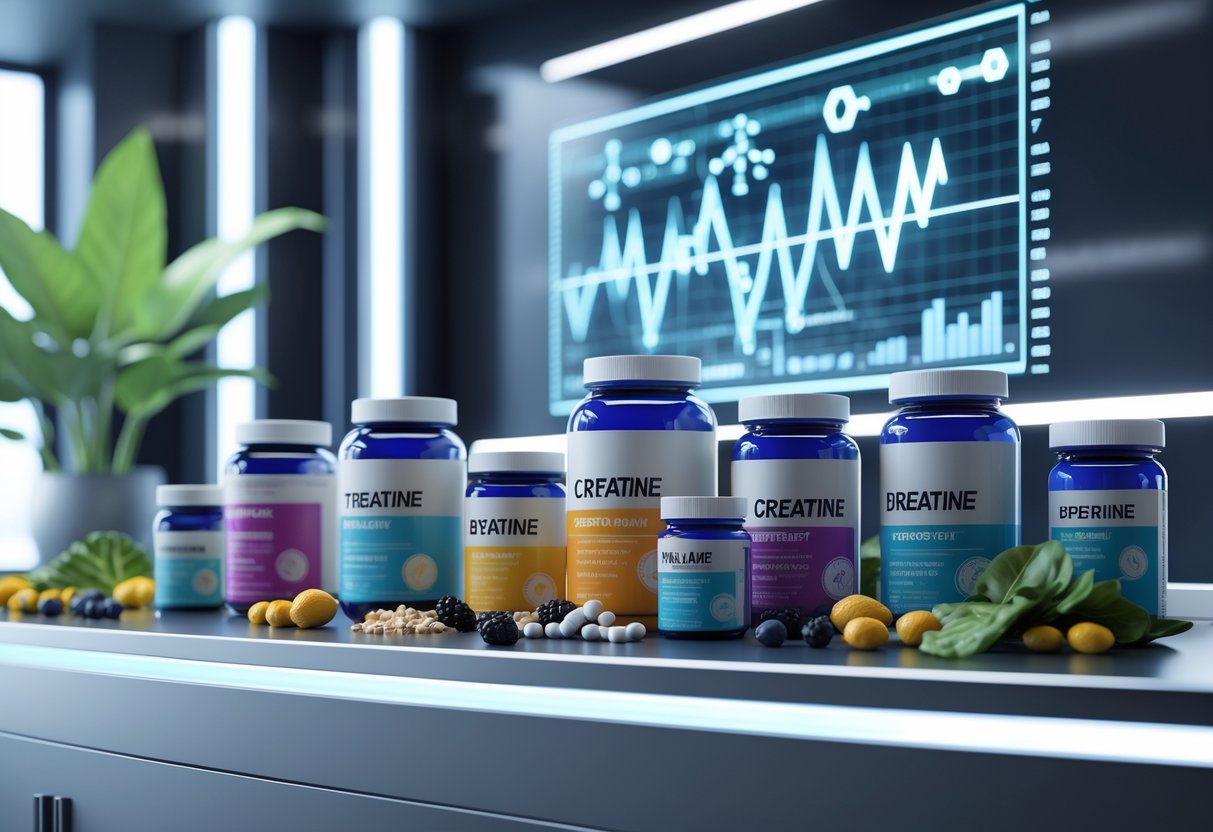
Protein powders and energy gels make nutrition easier during long gaming sessions. Creatine and caffeine have proven benefits, but most other supplements don’t have much real science behind them.
Protein Powders and Energy Gels
Protein powders can help you recover after tough training. Whey protein is packed with branched-chain amino acids—same as you’d get from chicken, fish, or eggs.
Most competitive gamers need about 1.6-2.2g of protein per kg of body weight daily. For a 70kg player, that’s 112-154g of protein.
| Source | Protein per serving | Cost |
|---|---|---|
| Whey powder (30g) | 25g | £0.80 |
| Chicken breast (100g) | 31g | £1.50 |
| Greek yoghurt (170g) | 15g | £0.60 |
Energy gels deliver fast carbs during tournaments over 90 minutes. Each has 20-30g of easy-to-digest sugars.
Lots of players actually find bananas or energy bars easier on the stomach. If you want to use gels, practise with them first during training.
Try chocolate milk after training—it’s got protein and carbs, and it’s way cheaper than most supplements.
Creatine, Caffeine, and Other Aids
Creatine boosts short bursts of high-intensity activity. Studies show 3-5g daily can improve reaction time and cut down on mental fatigue.
You’ll also find creatine in red meat and fish. Creatine monohydrate is affordable—about £15 a month—and works reliably for most people.
Caffeine sharpens alertness and focus. The sweet spot is 3-6mg per kg of body weight, taken 30-60 minutes before you compete.
| Caffeine Source | Amount | Timing |
|---|---|---|
| Coffee (250ml) | 100mg | 45 mins before |
| Energy drink | 80mg | 30 mins before |
| Caffeine tablets | 200mg | 60 mins before |
Don’t overdo caffeine—it can make you jittery or crash hard. The NCAA bans high levels (over 15 micrograms per millilitre in urine).
Most other supplements just don’t have much proof. Chromium for weight loss and BCAAs for muscle growth haven’t shown consistent results.
Talk to a sports nutritionist before trying new supplements. Focus on whole foods, then add proven aids like creatine and moderate caffeine if you need them.
Long-Term Health and Off-Season Nutrition
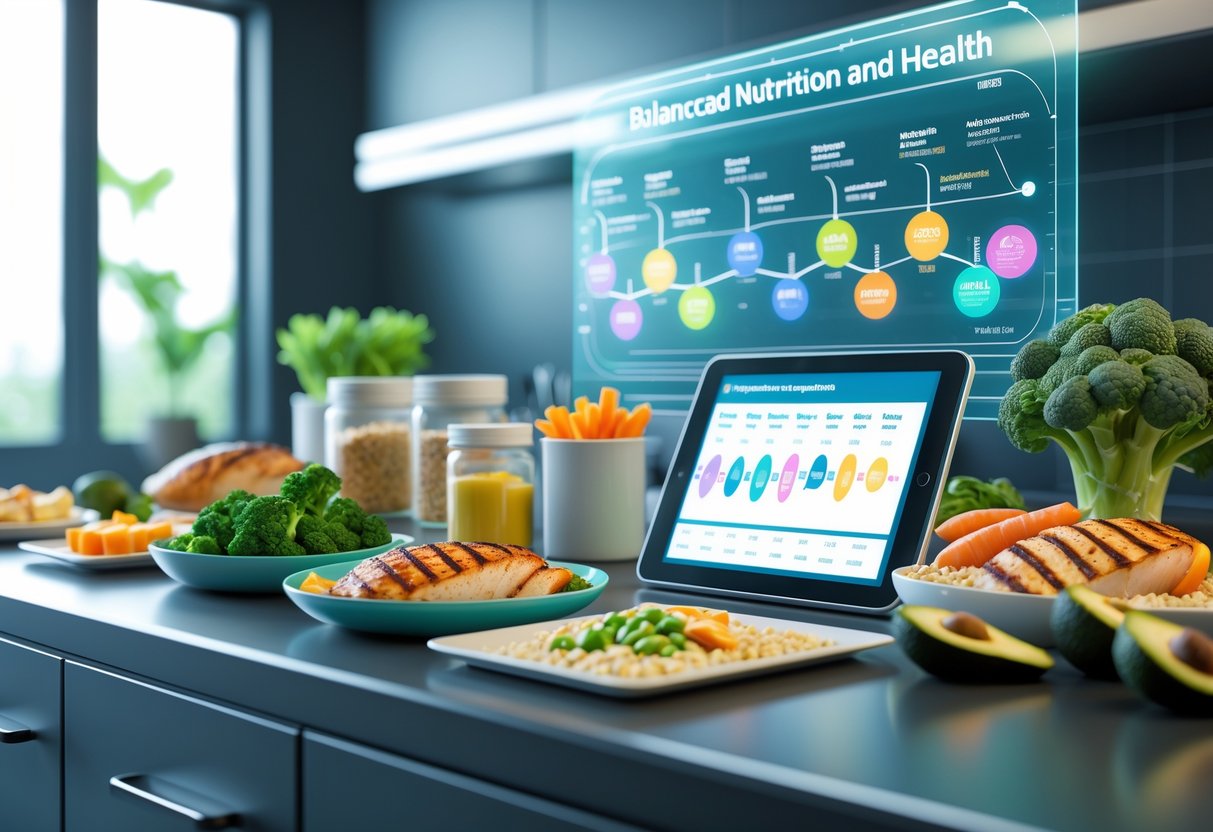
Smart off-season nutrition keeps gamers healthy all year and sets the stage for peak performance when tournaments roll around. We need to keep our immune systems strong and stick to balanced eating that fits our gaming lifestyle.
Supporting Immune Function
Intense gaming seasons can really wear down your immune system. Long hours, competition stress, and weird sleep schedules all add up.
Key nutrients for immune support:
- Vitamin C from oranges, bell peppers, and broccoli
- Zinc from lean meats, seeds, and legumes
- Vitamin D from fatty fish or supplements
- Probiotics from yoghurt and fermented foods
Eat colourful fruits and veggies every day—they’re full of antioxidants that help fight inflammation from those long sessions.
Quick immune-boosting habits:
- Swap energy drinks for green tea
- Add berries to your breakfast
- Cook with garlic and ginger
- Take a multivitamin if your diet’s lacking variety
After hard practice, get protein and carbs within 30 minutes to help your body bounce back.
Balanced Diet for Active Lifestyles
Gaming athletes need steady energy for long practice days. The brain chews through about 20% of your daily calories, so skipping meals or living on junk food just won’t cut it.
Daily nutrition structure:
- Breakfast: Protein + complex carbs (eggs with wholemeal toast)
- Lunch: Lean protein + veggies + healthy fats
- Dinner: Same as lunch, just watch your portions
- Snacks: Nuts, fruit, or Greek yoghurt between meals
Meal prepping on weekends saves you from grabbing fast food when you’re busy. Simple stuff like overnight oats, batch-cooked chicken, and chopped veggies makes life easier.
Hydration targets:
- 2-3 litres of water daily
- Add 500ml for sessions over two hours
- Herbal teas count too
- Keep caffeine under 400mg per day (about 4 cups of coffee)
If you plan your nutrition during the off-season, you’ll be ready when competition heats up. Build good habits now, and they’ll stick when the pressure’s on.
Common Mistakes and Troubleshooting
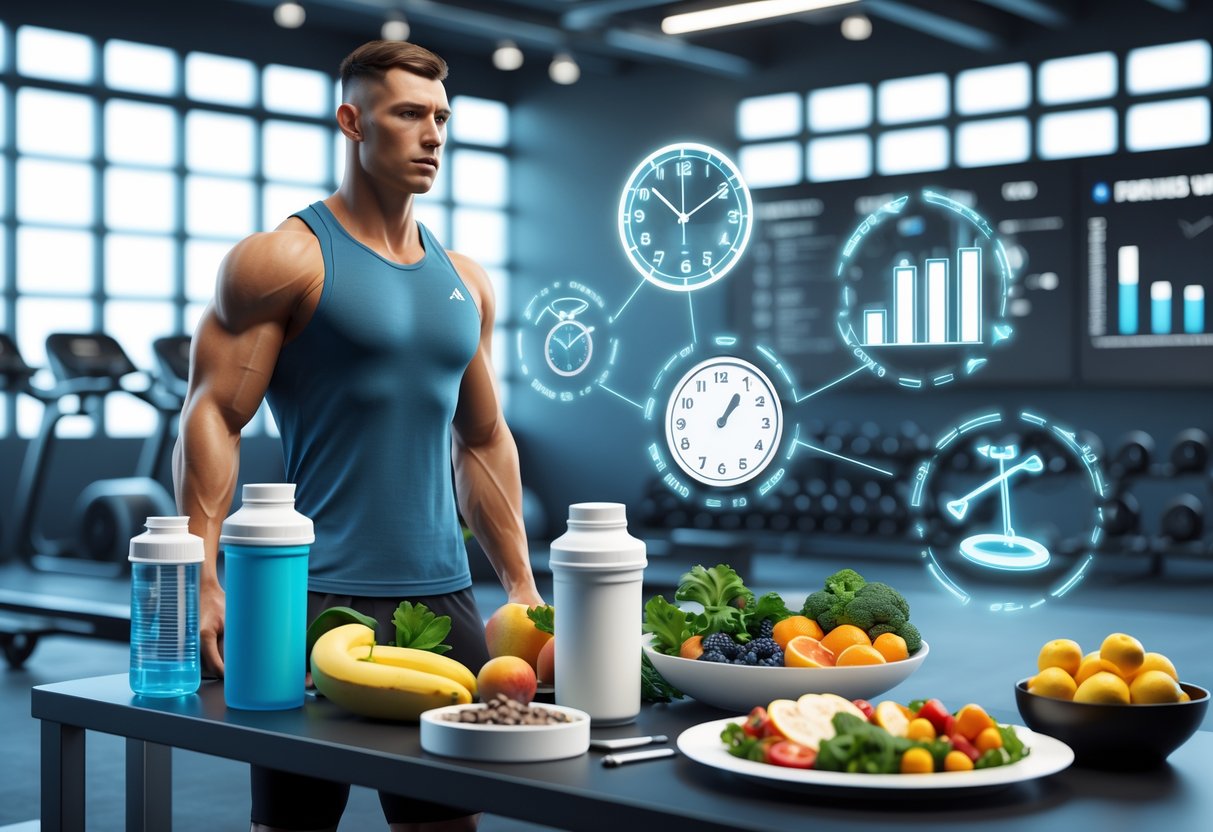
Competition day nutrition often goes sideways when athletes try out new foods, overeat because of nerves, or chug too much water hoping it’ll boost performance. Most problems come down to digestive issues and getting hydration levels completely wrong.
Managing Digestive Issues
Never try new foods on competition day. Your stomach already deals with stress from nerves, so tossing in unfamiliar foods? That’s just asking for trouble.
You’ll see this all the time at big tournaments. Athletes grab free energy bars or sports drinks they’ve never used before. Their bodies freak out—cramps, nausea, or worse hit at the worst possible moment.
Stick to foods you’ve practiced with. If you usually eat porridge before training, just stick with porridge before competing. No need to complicate things.
Some foods almost always cause issues:
- High-fibre stuff like wholegrains or beans
- Anything spicy or acidic
- Big meals too close to competition
- Dairy, if you’re sensitive
- Foods with artificial sweeteners
Timing really matters. Eat your main meal at least four hours before you compete. That gives your stomach a chance to settle down.
If nerves kill your appetite, go for liquid calories instead. A smoothie or a sports drink with carbs and protein can work when solid food just isn’t happening.
Some athletes even pack comfort foods from home. We know folks who bring their favourite biscuits or hot chocolate for the night before. Honestly, mental comfort is a big deal too.
Avoiding Dehydration Pitfalls
The most common mistake? Drinking way too much water, not too little. Athletes panic about getting dehydrated and overdo it. That can actually lead to hyponatremia—low sodium—which is the real culprit behind those nasty cramps.
We’ve watched athletes down 2-3 litres in the 90 minutes before their event. That just adds extra weight and leaves you feeling bloated, not to mention all those extra bathroom trips when you’re already nervous.
Here’s a better hydration plan:
- Drink like you normally would in the days before
- About 500ml in the two hours before your event
- Just small sips as you get closer to start time
- Use sports drinks instead of plain water
Check your urine colour. Pale yellow is what you want. If it’s clear, you’re overdoing it. Dark yellow? Time for more fluids.
In sports like sprinting, a lot of elite athletes actually compete a bit under-hydrated on purpose. Being lighter can give you a real edge with your power-to-weight ratio.
Quick tip: Rinse your mouth with a carbohydrate sports drink about ten minutes before competing, then spit it out. Oddly enough, research says this tricks your brain into thinking you’ve got more energy.
If things go off the rails on the day, don’t panic. Eating something imperfect is better than nothing at all. Flexibility beats perfection when competition stress hits.
Practical Meal and Snack Ideas for Competitions
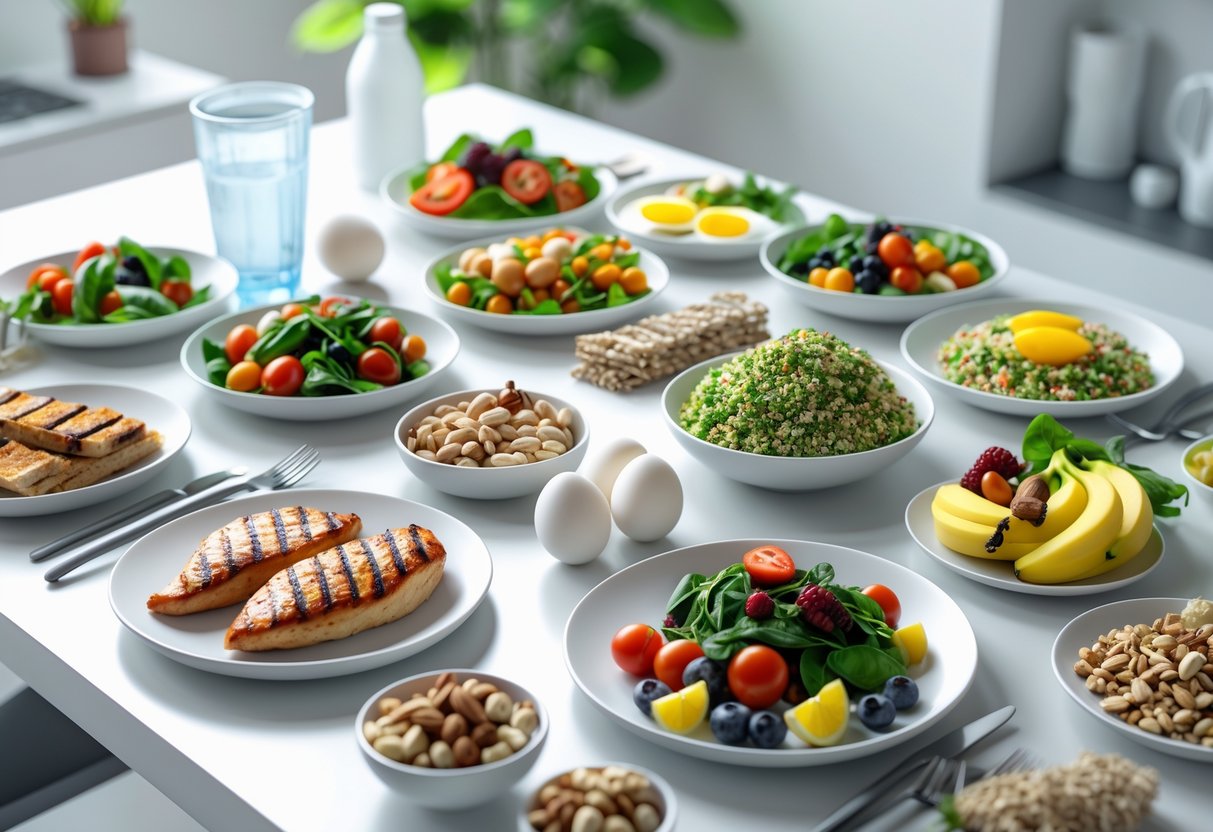
Smart food choices can honestly make or break your performance—sometimes it’s the difference between staying sharp or crashing out halfway through. Let’s look at some portable options for fueling your brain and a few quick recovery meals to help you bounce back between rounds.
Portable Pre-Event Snacks
Quick carb snacks are your best friend if you’ve got less than an hour between matches. Your brain just needs that fast energy to keep reaction times and focus up.
Try these:
- Banana with a handful of grapes
- Applesauce pouch (super easy, even one-handed)
- Low-fat granola bar
- Pretzels or plain crackers
- Dried fruit mix
If you have a longer break, mini-meals work better. You want carbs and some protein, but keep fat and fibre low to avoid stomach issues.
Some great combos:
- Peanut butter sandwich with banana slices
- Turkey wrap with apple pieces
- Greek yogurt with berries
- String cheese, crackers, and orange segments
- Trail mix (pretzels, dried fruit, cereal, nuts)
Here’s a quick win: Pack individual nut butter or hummus containers. They travel well and go with pretty much any fruit or cracker.
Quick Recovery Meal Examples
After you finish competing, you need to restore energy and help your body recover—ideally within 30-60 minutes.
Some easy options:
- Chicken and pasta with a light sauce
- Tuna sandwich with strawberries
- Bagel with almond butter and milk
- Greek yogurt bowl with granola and fruit
Don’t forget about hydration. Water’s fine for short sessions, but sports drinks help replace electrolytes during long tournaments.
Keep perishable foods like yogurt, cheese, and deli meat cold all day. If you can’t wash your hands, bring hand sanitiser.
And a quick word of warning: Don’t experiment with new foods on competition day. Test your tournament menu during practice first.
Frequently Asked Questions
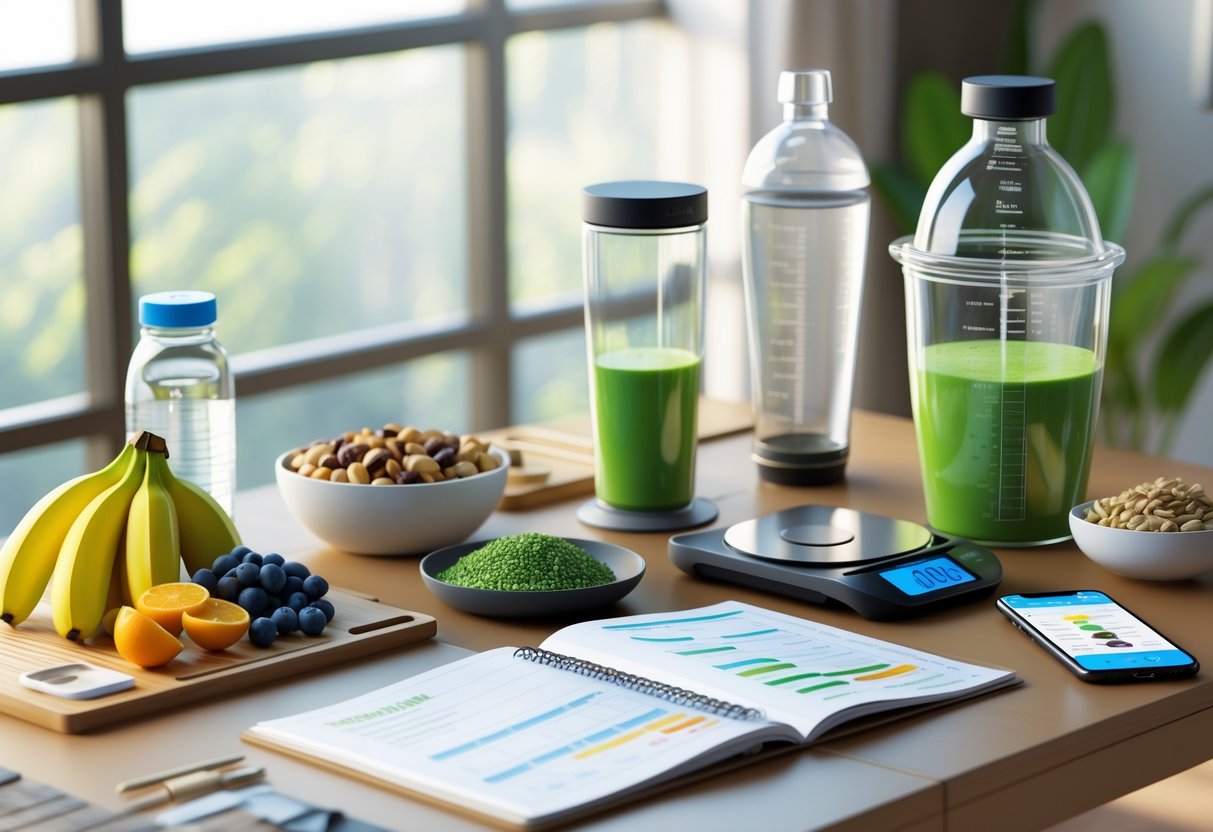
Athletes at every level have questions about competition nutrition. Here are some practical answers about meal planning, performance foods, and strategies for fueling your best results.
What kind of meal plan should athletes follow in the week leading up to a competition?
Athletes need consistent fueling during competition week. I’d suggest three balanced meals and two snacks each day.
Each meal should have lean protein, complex carbs, and vegetables. Think grilled chicken with rice and broccoli, or salmon with sweet potato and spinach.
Training volume changes your needs. On heavy training days, eat more carbs to top up muscle glycogen. On lighter days, focus more on protein for recovery.
Eat your biggest meal about three days before competition. That way, you avoid digestive issues but still fill up your energy stores.
Skip new foods during competition week. Stick with what you know works for your body.
Can you give examples of pre-competition meals that can boost performance?
Three to four hours before you compete, eat a solid meal with carbs and moderate protein. Porridge with banana and honey? Always a winner.
Pasta with lean meat and veggies gives you steady energy. Add a little olive oil for healthy fats.
One to two hours before, go lighter. A banana with peanut butter gives quick energy without weighing you down.
Greek yogurt with berries and granola is another good choice. Toast with jam and a bit of protein works too.
About thirty minutes before competition, keep it super simple—just carbs. Sports drinks, energy gels, or dates work fast.
Avoid high-fibre foods, too much fat, or big portions close to your event. Those can mess with your stomach when you least want it.
Which foods are considered the best for enhancing athletic performance?
Complex carbs are the backbone of performance nutrition. Brown rice, quinoa, and sweet potatoes give you energy that lasts.
Oats are great for steady fuel and have beta-glucan fibre to keep blood sugar stable. Wholemeal bread and pasta work well too.
Lean proteins help with muscle function and recovery. Chicken breast, fish, eggs, and Greek yogurt top the list.
Plant-based athletes can go for lentils, chickpeas, and tofu. These offer protein and extra carbs.
Antioxidant-rich foods help your body recover from tough exercise. Berries, dark leafy greens, and colourful veggies are all good bets.
Tart cherry juice might help you sleep better and reduce muscle soreness. Beetroot juice could boost endurance thanks to nitrates.
How can nutrition impact an athlete’s performance during a competition?
How you fuel up directly changes your energy levels through competition. If you don’t get enough carbs, you’ll hit fatigue and lose power.
Even mild dehydration—just 2% of your body weight—can drop your performance by 10-15%. You’ll notice slower reaction times, worse decision-making, and less endurance.
Blood sugar levels affect your concentration and coordination. Bad nutrition choices can lead to energy crashes right when you need to focus.
Protein intake keeps your muscles working and helps you recover between events. Not enough protein can mean more muscle breakdown during long competitions.
Timing is a big deal. Eat too close to your event and your stomach might rebel. Eat too early and you risk running out of energy.
Nutrition also supports mental performance. Stable blood sugar helps you stay focused and confident when it counts.
What is the significance of proper nutrition for athletes’ success?
Consistent nutrition is honestly what separates good athletes from great ones. It’s not just about training hard—it’s about training smart and recovering well.
Nutrition impacts everything: energy production, muscle contraction, oxygen delivery, and waste removal all depend on fueling right.
Recovery speeds up with good nutrition, so you can train more often and lower your risk of injury.
We’ve seen athletes lose after months of prep, just because they messed up their fueling on competition day.
Long-term health depends on meeting those higher nutrition needs. Athletes who ignore nutrition get sick and injured way more often.
Proper nutrition also keeps your hormones, immune system, and bones healthy. Those things really matter for career longevity and staying at your best.
What are some simple dietary strategies for athletes to maintain their energy levels?
Eat regularly throughout the day to keep your blood sugar steady. Try to have a meal every three to four hours, and toss in some snacks between.
Don’t skip breakfast, especially if you’re training. That first meal really sets the tone for your energy.
Hydrate consistently instead of waiting until thirst hits. If your urine is pale yellow, you’re probably on the right track.
Busy day? Pack snacks you can grab on the go. Trail mix, energy bars, or fruit are easy to stash and give you a quick boost.
Plan ahead by prepping meals and snacks when you have time. That way, you’re less likely to grab whatever’s easiest (and usually not the best).
Pair carbs with protein to keep your energy up. Apple slices with almond butter, for example, work way better than just fruit alone to keep blood sugar balanced.

